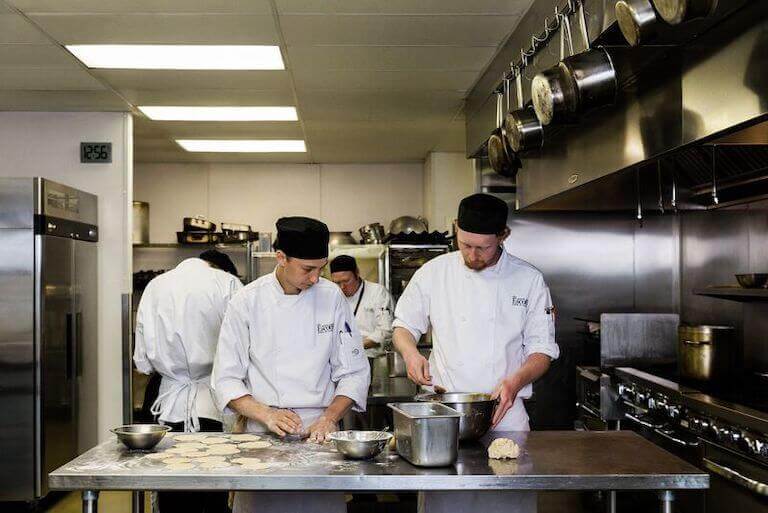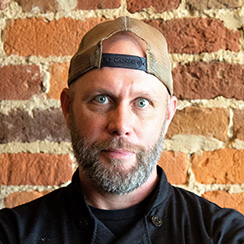By now, you may have heard the term “Great Resignation” which has certainly affected the restaurant industry in the last decade. According to a recent 2022 report conducted by the National Restaurant Association, a majority of restaurants don’t have enough staff to assist their current service volume.
This begs the question of why this is happening and what can be done to solve the issue.
Although there are several factors that might come into play, the restaurant industry can be grueling and many kitchen staff experience notorious “burnout.” But the good news is that there are solutions that may ease overactive nervous systems and combat chronic stress. Let’s explore our five handy tips for how to avoid burnout.
1. Recognize the Red Flags
Many of us operate from a baseline level of stress, and this especially might be the case for professional chefs—kitchen chaos is likely an unavoidable part of the culinary life. However, there might be times when the stress becomes debilitating, and that may inhibit a chef’s ability to function properly.
Here are a few signs that might indicate burnout in the kitchen:
Lack of motivation or passion: This may result in ambivalence toward the once beloved art of cooking.
Reliance on coping mechanisms: Some chefs may also deal with this abundance of stress by turning to unhealthy habits like excessive alcohol or tobacco use, and this is not only physically unhealthy but generally seen as unprofessional conduct.
Explosive mood swings: Overworked chefs may have trouble holding in their stress, possibly resulting in exploding at customers and coworkers. This behavior is unprofessional and may affect the ability and communication of the entire kitchen.
Insomnia: Stress oftentimes interferes with our neurological and hormonal system, which impacts our sleep patterns. If you struggle with insomnia, even after a long day in the kitchen, this might be a sign of burnout.
2. Break up the Monotony
Did you know that one of the main causes of burnout is “unavoidable monotony” in your daily routine? When your body falls into the paralyzing trap of repeating the same ordinary habits, you get almost too comfortable, which may lead to boredom, resentment, and an onslaught of other emotions.
So whether you’re a corporate executive or a chef, it’s encouraged to try and spice up your daily routine. For instance, when you come into the kitchen one day, start with a new task rather than your usual one. You might also assign other tasks to the rest of the kitchen staff, which could rejuvenate the entire workplace! Perhaps you make a concerted effort to go outside and breathe in the fresh air every hour or so. No matter what you choose to do, the important thing is to combat those complacent feelings by switching up your daily routine.

Escoffier students collaborating on tasks, breaking up the daily monotony to avoid burnout.
3. Practice Frequent Self-Care
Professional chefs may step into the kitchen with a litany of demands and long work hours. It also might feel impossible to complete tasks with excellence and ease when you’re not prioritizing your own self-care.
When you don’t carve out time to relish in activities that nourish your nervous system, burnout might storm in unexpectedly, without any blaring warning signs.
Here are a few important self-care tips on how to avoid burnout for the long term.
Sleep More
According to the National Sleep Foundation, the average adult should get at least 7 hours of rest each night. If you’re having trouble sleeping, speak with your primary care physician.
Eat Better
Even as a chef, it’s not always easy to feed yourself the proper nutrients. You might want to consider a carbohydrate-rich diet—like fruits, whole grains, and healthy oils, according to the Harvard T.H. Chan School of Public Health.
Take Vacations
Many chefs may suffer from martyr syndrome—that “always stuck in the kitchen” feeling. However, vacations might be one of the best ways to reduce stress. A vacation may ensure a healthy “work-life” balance, plus you’ll likely come back feeling more energized and motivated than before.
Work Out Regularly
Exercise might be one of the most effective ways to reduce long-term stress and may even improve your physical functions. To make room for a workout routine, you might want to try walking or biking to work or even recruit a gym buddy for accountability.
Practice Gratitude
According to Psychology Today, gratitude might improve overall life satisfaction and improve well-being in the long run, which may help combat burnout. Perhaps try writing down in a journal two to three things you are grateful for each week, and try to keep those things top of mind during stressful situations.
4. Nix the Second Job
It’s pretty common for chefs to feel inclined to work a second job to pay the bills and become that “jack-of-all-trades.” But often, when you stretch yourself too thin and feel like you’re unable to manage your schedule, coupled with everyday life demands, burnout might ensue.
Think about maintaining one job and funneling your energy into that. Aim to accomplish your tasks with greatness, and consider setting achievable milestones. Sometimes, this may lead to a promotion, pay raise, and other exciting rewards.

5. Find Confidence in Your Skills
Chef Ming Tsai is a pioneer of fusion cuisine and the author of several cookbooks. He mentioned that the way to improve retention and burnout stems from a chef’s initial training. Translation: chefs should make sure they receive the best education possible to feel confident in their skills.
This “concept” is part of our human nature—when we feel completely capable, relaxed, and assured in our working environment, we naturally feel a sense of accomplishment. This long-term feeling may ultimately supersede feelings of burnout.
At Escoffier, students in the culinary arts program can complete a well-balanced, thorough curriculum that covers an array of topics that refine their skills. This includes “culinary foundations” that may encompass a wide range of cooking terminology, methods, and techniques that are practiced in modern kitchens today.
“My education with Escoffier has really given me a good foundation. It has filled a resume gap; it’s filled a professional gap and a skills gap. It has helped me in all aspects of my culinary career.”*
Lance McWhorter, Escoffier Online Culinary Arts Graduate
Hone in on How To Avoid Burnout
As mentioned in the beginning, you don’t have to let burnout in the kitchen take over your life as a professional chef. There are ways to mitigate ongoing stress and implement practices that might benefit you in the short and long term.
One of the best ways to do this is by sharpening your skills as a chef and engaging in a curriculum from an accredited institution. Discover Escoffier’s culinary school programs to find the right one to help you achieve your culinary goals!
Enjoyed these tips for chefs? Try these articles next!
- How Chefs Can Manage Stress In a Professional Kitchen
- 5 Ways to Manage Your time as a Chef
- What Culinary Training Do You Need for a Professional Cooking Career?
This article was originally published on January 4, 2016, and has since been updated.
*Information may not reflect every student’s experience. Results and outcomes may be based on several factors, such as geographical region or previous experience.

 “My education with Escoffier has really given me a good foundation. It has filled a resume gap; it’s filled a professional gap and a skills gap. It has helped me in all aspects of my culinary career.”*
“My education with Escoffier has really given me a good foundation. It has filled a resume gap; it’s filled a professional gap and a skills gap. It has helped me in all aspects of my culinary career.”*